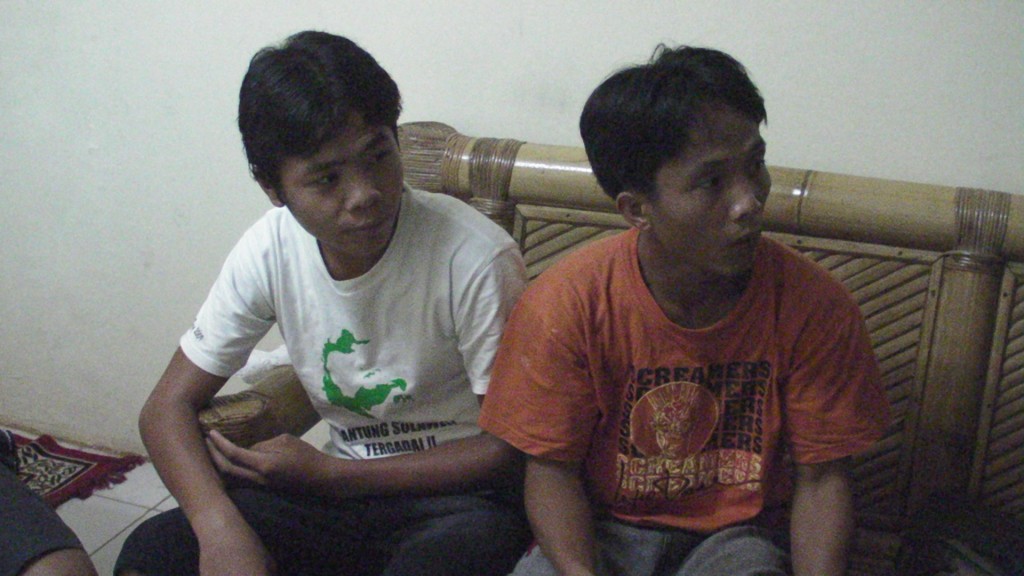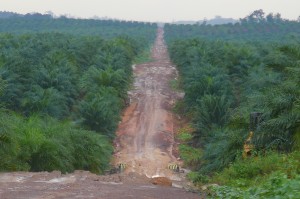
Despite the 7.2 magnitude earthquake, tsunami and successive volcanic eruptions from Mt. Merapi this November, I made my way to Indonesia to attend the 2010 Roundtable on Sustainable Palm Oil conference, meet with allied organizations, and visit highly disputed palm oil plantations.
The rapid proliferation of palm oil plantations has had grave effects on Indonesian rainforests- loss of wildlife habitat, increased climate change, and mass infringements of Indigenous rights. These disturbing details I was already well aware of, but after meeting three young men in Java, my eyes were opened to a chilling facet of the global palm oil trade that turns out to be all too common- slavery.
Ferdi and Volario, 14 and 21-years-old respectively, are from neighboring communities in North Sumatra and experienced nearly identical stories. A representative from PT 198, a subsidiary of a Malaysian palm oil company Kuala Lumpur Kepong (KLK), came to their village offering jobs in the palm oil industry. The rep promised a good salary and work that suited their skill level, claiming those with driver’s licenses would take trucking positions and those with diplomas would work in the company offices. Both Ferdi and Volario seized on the opportunity of good work and good salaries. Much to their surprise, they were given the same job as all the other workers on that plantation upon arrival: fertilizer sprayers.

The two worked grueling hours each day spraying oil palm trees with toxic chemical fertilizers, without any protection to shield their hands, face or lungs. After work, Ferdi and Volario were forced inside the camp where they’d stay overnight under lock and key, guarded by security. If they had to use the bathroom, they’d do their best to hold it until morning or relieve themselves in plastic bags or shoes.
After working under these conditions for several months without pay, Ferdi and Volario ran away from the palm oil plantation. To this day they have not been paid by PT 198.
I also spoke with a 42-year-old man named Suroso from Central Java. Suroso was approached by another oil palm company with the prospect of a well-paid career, along with promises of schooling, access to a local hospital, and all the protective gear necessary to take on the job of “opening the land,” or clearing natural forests to make way for rapidly expanding palm plantations. This company promised him 400,000 rupiah per hectare ($44US), and assured him that the land was flat, the trees small, and the work quick and easy.
After traveling by bus without food or water for 16 hours, Suroso found himself guarded by high security on his long boat journey to Borneo. When he finally arrived at his East Kalimantan work site, he was told he’d have to pay for his own protective gear–masks, gloves and hard hats–even though he wouldn’t be getting paid until he and his 20-man team team cleared 60 hectares (approximately 148 acres) of steep, thick forest. There wasn’t a school or a hospital for Suroso and the other men, very little food, and a stream used for drinking water, washing and human waste, which he described as “not suitable for human survival.”
After two months of backbreaking work and barely livable conditions, Suroso was paid 200,000 rupiah ($22US) for clearing 60 hectares of land. He and several of the other workers made an escape plan. Suroso got some help from the Center for Orangutan Protection (COP) and ended up in Sawit Watch’s office, figuring out next steps and sharing his harrowing story with me.
While some industry pundits purport that the palm oil industry is an invaluable way to alleviate poverty, it couldn’t be further from the truth. The personal accounts highlighted here are just a few examples of dozens that I encountered on my travels in Indonesia. In addition to horrid health and safety conditions and slave wages, all who protest are deemed criminals both by the palm oil companies and the Indonesian government. Hundreds of workers have been arrested for protest on palm oil plantations.
Incredibly profitable for multinational companies and terribly damaging for people and planet, palm oil remains one of the most bitterly controversial commodities in the world.
